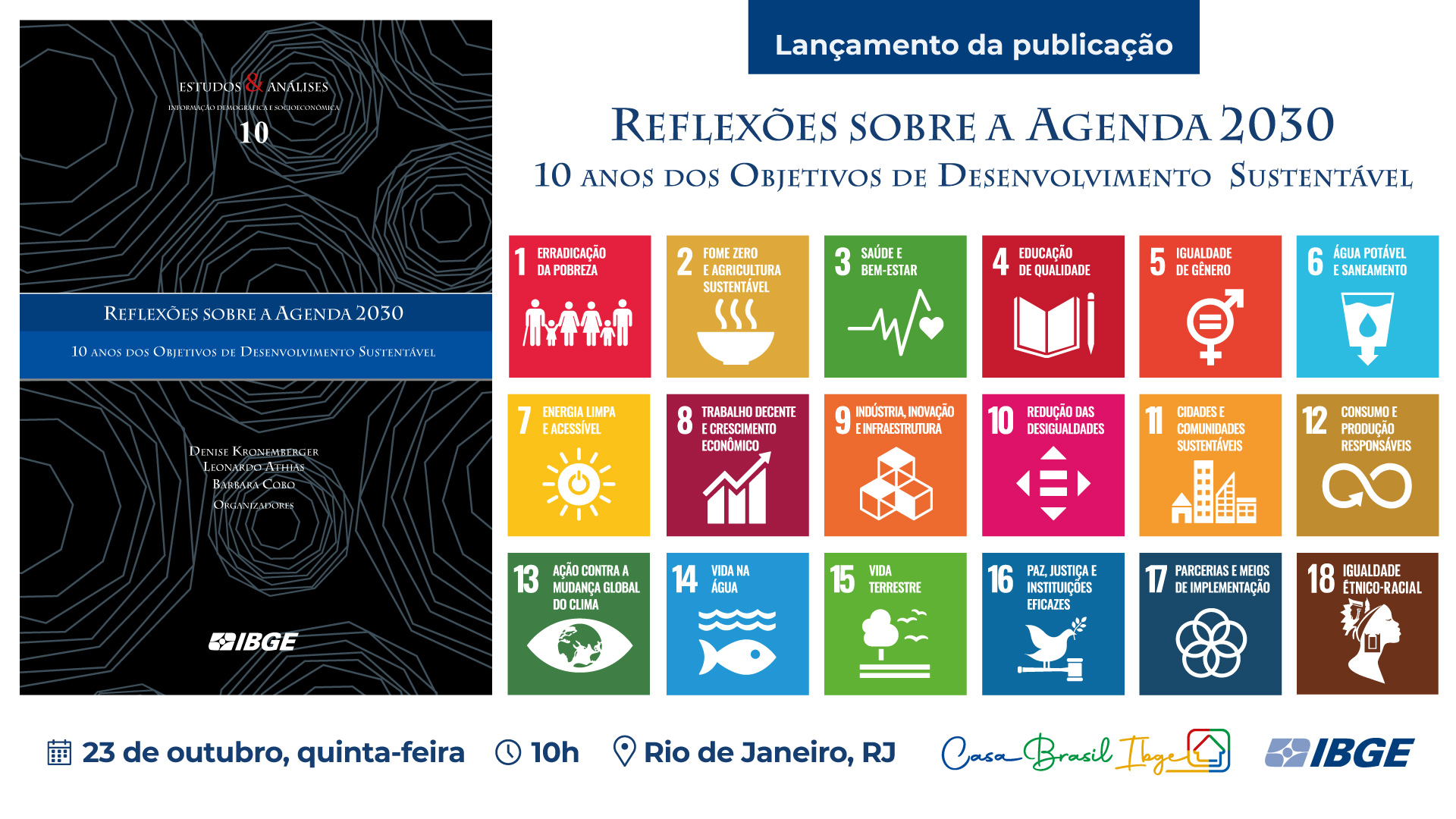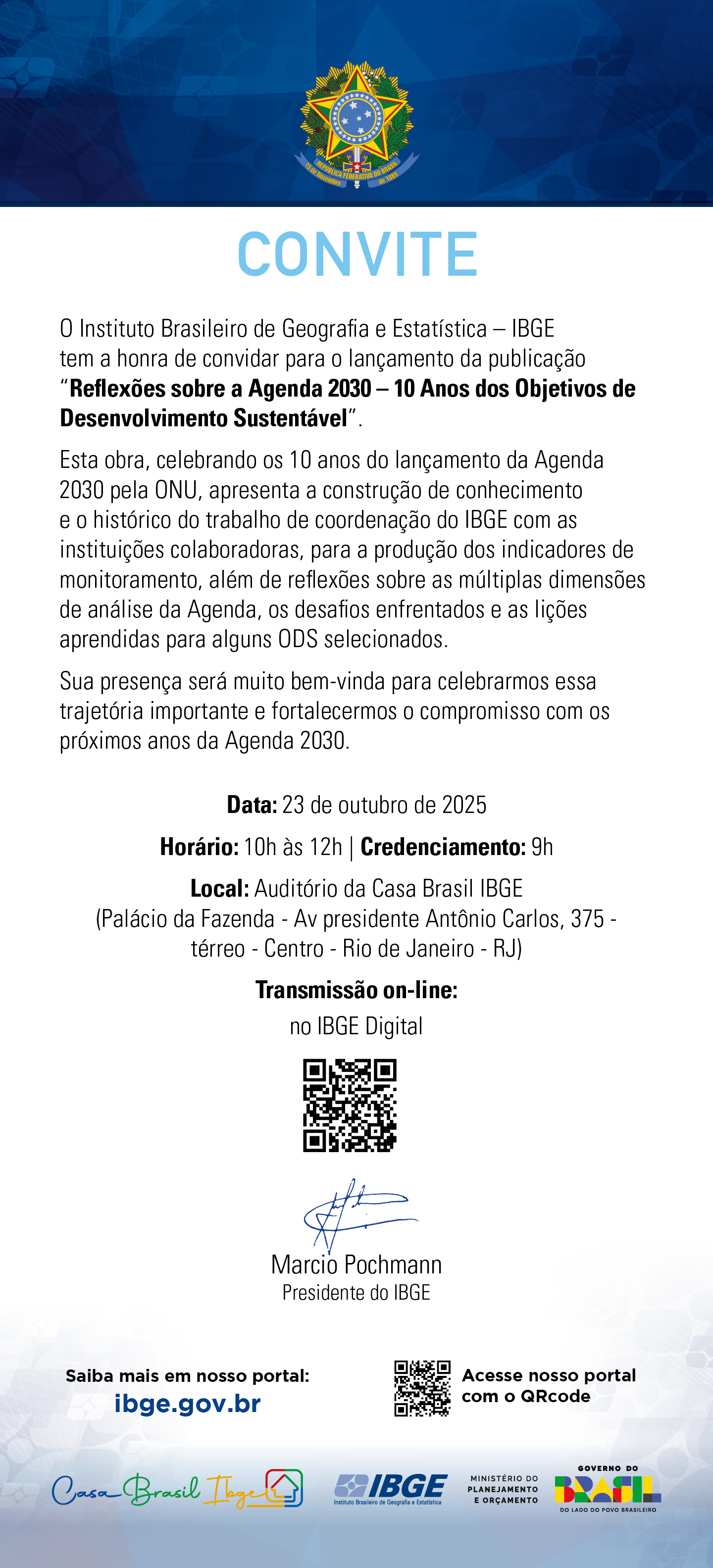Sustainable Development Goals
IBGE celebrates 10 years of the SDGs with new publication and event
October 20, 2025 10h00 AM | Last Updated: October 23, 2025 12h45 PM

The publication "Reflections about the 2030 Agenda - 10 Years of the Sustainable Development Goals" will be launched during an event at Casa Brasil IBGE next Thursday (23) in Rio de Janeiro, RJ, starting at 10 am. The event will be attended by Denise Kronemberger, general coordinator of the SDG Indicators Project at the IBGE, by researchers Leonardo Athias and Barbara Cobo, organizers of the work and by the authors of its eight chapters. The event will be streamed on Digital IBGE.
The project celebrates the work of the IBGE and of collaborating institutions in the production of indicators for monitoring the SDGs, as well as considerations on the multiple dimensions of the 2030 Agenda, the challenges faced, and the lessons learned.
About the 2030 Agenda
Created in 2015, the 2030 Agenda comprises 17 SDGs and 169 global action targets to be achieved by 2030, which encompass the environmental, social, and economic dimensions of sustainable development in an integrated, indivisible, and interrelated manner.
To monitor the SDGs, the UN Statistical Commission has defined global indicators based on internationally standardized methodologies created by monitoring agencies in cooperation with member countries. These instruments are fundamental for monitoring and evaluating the implementation of the 2030 Agenda, ensuring sustainable development and the inter- and intragenerational commitments made in 2015. Also, they help strengthen National Statistical Systems, expand the available database and reinforcethe role of official institutions in the coordination and production of public statistics.
Learn more about each chapter of the new publication
The first chapter of the publication "Reflections about the 2030 Agenda - 10 Years of the Sustainable Development Goals" pesents the history of the indicators' production, discusses the inclusion of the IBGE in the National Commission for Sustainable Development Goals (CNODS), and highlights the main challenges observed and lessons learned in this process. The second chapter addresses the environmental dimension of the 2030 Agenda, as well as its cross-cutting nature, with examples based on the following SDGs: 12 - Responsible Consumption and Production; 13 - Climate Action; 14 - Life Below Water; and 15 - Life on Land.
The third chapter covers the social dimension of the 2030 Agenda, with examples that highlight the following SDGs: 1 - No Poverty; 2 - Zero Hunger and Sustainable Agriculture; 3 - Good Health and Well-being; 4 - Quality Education; 8 - Decent Work and Economic Growth; 10 - Reduced Inequalities; and 16 - Peace, Justice, and Strong Institutions. The fourth chapter deals with the economic dimension of the 2030 Agenda, and considers examples from the following SDGs: 2 - Zero Hunger and Sustainable Agriculture; 8 - Decent Work and Economic Growth; and 9 - Industry, Innovation, and Infrastructure.
The fifth chapter covers the disaggregation of data by characteristics that prevent or threaten to prevent certain segments of society from achieving the proposed targets for all population groups, as well as the intersectionality of factors that make some segments more likely to be left behind. In the sixth chapter, the authors show an overview of geospatial data based on SDG indicators through the Interactive Geographic Platform (PGI), comment on the main functionalities of this tool, and discuss the processes of constructing geospatial data represented by geoservices.
The seventh chapter refers to research activities developed at the National School of Statistical Sciences (ENCE), the academic section of the IBGE, related to the SDGs. The eighth chapter, finally, discusses SDG 18 – Racial and Ethnic Equality, which, having been launched by Brazil in 2023, aims to eliminate racism and discrimination in all its forms against Indigenous peoples and people of African descent.
SERVICE
Reflections about the 2030 Agenda - 10 Years of the Sustanainable Development Goals
Date: October 23, 2025
Time: 10 am - noon, with registration at 9 am
Venue: Auditório da Casa Brasil IBGE (Palácio da Fazenda - Av. Presidente Antônio Carlos, 375 - Térreo - Centro - Rio de Janeiro/RJ)
Streamed on: Digital IBGE





















